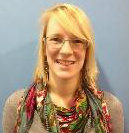
For a taste of what it’s like to work in an independent social work practice, register for your free place at this month’s Community Care Live, where the practice based in Surrey, FirstPoint, will give a presentation about its work. In this piece, FirstPoint social worker Hannah Preece talks about what it’s been like to move out of local authority work into an independent service.
I qualified as a social worker in the summer of 2010 and joined Surrey Council’s deaf services team that September. I had been with the team for about eight months when I found out that we had been chosen to be one of seven social work practice (SWP) pilots across the country.
When I initially found out that we were going to become a SWP and, more specifically, a community interest company (CIC), I had mixed feelings. The concept seemed to have some positives, but I wasn’t sure how changes would happen and I questioned how much difference it would make. However, despite my uncertainty, I could see some potential for positive change: more flexibility in working practices, greater freedom to make decisions, any profits being made to go back into the community with whom I work, and more contact with service users as a result of reduced bureaucracy. My main concern was the impact that the change would have on our service users. At the end of the day the most important thing was that services improved for them.
The process of change from a local authority team to a CIC has been an interesting one; there was a consultation period and we were eventually seconded out in November 2011. It has been a challenge to maintain the delivery of our services whilst at the same time setting up a business and exploring better ways of doing what we do and implementing this! As a shareholder it took some time for me to feel that what I said would be taken on board, or that it would result in change. However, I am now starting to feel that maybe things can change. Someone who visited the team said that staff being given ownership over the business has resulted in a fresh injection of energy into the team – there are lots of ideas!
My team, now called FirstPoint: Hard of Hearing, Deaf and Interpreting Services CIC, works with people who are deaf or have an acquired hearing loss. The team consists of three main strands; the social work team, the hearing loss advisory team and the interpreting service.
It is still early days but gaps in the service are being identified and steps are being taken to fill these gaps. Some of the changes so far include: starting a volunteer database, for volunteers to come and work with our service users and also for our service users to have the opportunity to volunteer to develop their skills; offering a course on living with hearing loss for people with an acquired hearing loss, to improve their ability to communicate with family and the wider community; and improved access to us for clients through the use of Skype and video calls. Now we are FirstPoint there are not as many layers of management, meaning some decisions can be made much quicker, such as recruiting new staff.
I think some areas, especially within the social work team, will take longer to develop, but one major change that I hope to see is us having our own budget. Currently we have to request funding from teams within Surrey Council and this can be quite a lengthy process – if we had our own budget, then service users would get outcomes much quicker. We are also hoping to create a signed, British Sign Language DVD on the supported self-assessment, as an alternative to service users receiving information in English; this will enable them to watch it before we visit therefore empowering them and increasing their independence.
I’m not saying there are not struggles and difficulties (it wouldn’t be social work if that was the case!), but there seems to be a change in how staff are feeling. Before, it was, “the computer says no”, so to speak, and that was it; but now if the computer says no then we are asking, “ok, then how can we get round this, how can we deliver services better?”. I suppose I feel that social work is social work, and we all know that sometimes there are gaps in resources, but if we can be active in facilitating the development of new resources, then fantastic!
Community Care Live
The future of social work and personalisation under one roof at this year’s Community Care Live
Supervision and CPD: Catch up on the latest at Community Care Live
Adoption, Munro and navigating court appearances
More on social work practices


 Bournemouth, Christchurch and Poole
Bournemouth, Christchurch and Poole  Hampshire County Council
Hampshire County Council  Lincolnshire County Council
Lincolnshire County Council  Norfolk County Council
Norfolk County Council  Northamptonshire Children’s Trust
Northamptonshire Children’s Trust  South Gloucestershire Council
South Gloucestershire Council  Wiltshire Council
Wiltshire Council  Wokingham Borough Council
Wokingham Borough Council  Children and young people with SEND are ‘valued and prioritised’ in Wiltshire, find inspectors
Children and young people with SEND are ‘valued and prioritised’ in Wiltshire, find inspectors  How specialist refugee teams benefit young people and social workers
How specialist refugee teams benefit young people and social workers  Podcast: returning to social work after becoming a first-time parent
Podcast: returning to social work after becoming a first-time parent  Podcast: would you work for an inadequate-rated service?
Podcast: would you work for an inadequate-rated service?  Family help: one local authority’s experience of the model
Family help: one local authority’s experience of the model  Workforce Insights – showcasing a selection of the sector’s top recruiters
Workforce Insights – showcasing a selection of the sector’s top recruiters 

 Facebook
Facebook X
X LinkedIn
LinkedIn Instagram
Instagram
Comments are closed.